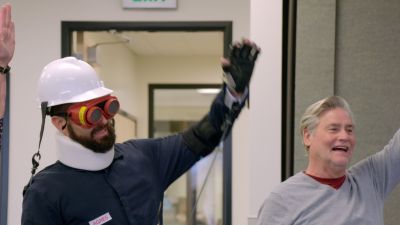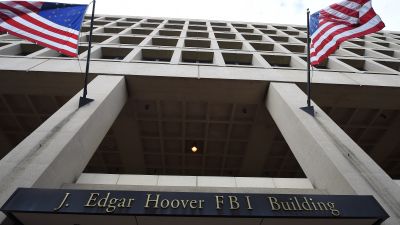To make a three-and-a-half-hour film about a place where people go to sit and read books is not an endeavor that a lot of filmmakers would eagerly take on. But Frederick Wiseman’s new film, Ex Libris — New York Public Library, does just that — and it’s an invigorating, provocative and moving documentary.
While many of Wiseman’s other films examine the darker forces of institutions, Ex Libris is a meditation on the central role of the New York Public Library (NYPL) in New York’s intellectual and civic life.
Like all of Wiseman’s films, his genius lies in the ways in which he can create meaning out of the mundane. Wiseman wanders the administrative halls of the library and drops in on staff meetings that might otherwise be seen as a bore. But Wiseman’s lens finds meaningful exchanges, such as the conversation about providing internet services that becomes an exchange about democracy and access to information. The library constantly grapples with questions of public service, democracy and knowledge.
For many in Manhattan, the Beaux-Arts landmark in midtown is a place to exchange big ideas. A roster of celebrity thinkers from Richard Dawkins to Patti Smith headline events and are welcomed by the iconic stone lions at its entrance. But the 92 smaller, more humble branches are also important, and Wiseman gives them equal weight. While Ta-Nehisi Coates critiques the rhetoric of black-on-black crime under media lights at the main branch, across town at the Macomb’s Bridge Library in Harlem, a black man movingly recounts how he couldn’t afford to attend film school. Instead, he learned the craft of filmmaking at his local NYPL branch.
Wiseman shows how institutions like public libraries are vital to addressing issues of poverty, racism and crumbling education systems. But he also shows that not everything at the library is about big ideas. In one scene, a librarian explains, without a trace of irony, that unicorns are imaginary, then proceeds to translate an old English text without batting an eye.
This provocative film reminds us that public institutions like our local libraries are forces for good. In a time where truth and knowledge seem under attack in politics and public life, libraries are places for civic engagement and intellectual empowerment.
Wiseman spoke to me about Ex Libris, his 42nd documentary, and the filmmaking style he developed over a 50-year career.
Titi Yu: Was the library important to you when you were growing up?
Frederick Wiseman: Yes, in the same way that it’s important to any kid growing up. My mother started to take me to a library when I was quite young, and I know a lot of the books I initially read were borrowed from the library. And of course when I went to college I had to do research papers in the library. But once I finished college and law school I didn’t use libraries very much because I always like to buy books that I read. So from the time I was 24, I hardly ever went to a library.
— Frederick Wiseman
TY: Was there something surprising to you that you discovered in the course of making this film?
FW: I didn’t realize and I still don’t know to what extent the NYPL is exceptional. But I learned about the diversity and quality of services they offer — such as after-school programs, language courses, computer courses and all kinds of business courses — that are available for anybody who wants to take them, including recent immigrants. I don’t think it’s an exaggeration to say that the NYPL provides thousands of opportunities for people that go beyond borrowing books and scanning the archives. And that surprised me. Perhaps it shouldn’t have, but I didn’t know it before I made the movie.
The fact is, libraries have become cultural centers and education centers, as Toni Morrison said in the film, libraries are great democratic institutions. It’s a great democratic institution not only because anybody can use it, but because they treat everyone equally and you can find people from all social classes, races, ethnicities and economic situations using a library.
TY: How much research do you do before you start filming, or do you rely more on instinct once you start rolling?
FW: It’s more of the latter. Before I started filming, I spent half a day at the main branch on 42nd Street and half a day visiting three other branches, and that was it. I don’t like to be doing research and not be prepared to get what was going on. For example, if I’d been at that branch in Harlem on the day they were having that meeting with residents who live in the housing project to which the library was attached, I would have been very upset to have missed that. So when I’m present, I like to be ready to film. At least I know when I’m not present, I don’t know what I missed. But I was happy just to be there observing this spectacular moment that day. So the shooting is really the research.
TY: Have you thought about changing your style and trying a different approach?
FW: No. I think I thought more about that in the beginning of my career and I like this approach, so I’ve stuck to it for 50 years.
TY: You ask a lot of your audience. It’s not easy these days in our fast-paced social media world to sit through an almost three-and-a-half-hour documentary. Have you seen a change in the way audiences respond to your films over the years?
FW: It’s very hard for me to talk about audiences because I don’t do any kind of research on audiences. And my contact with people who see the movies is quite episodic. The only time I get a chance to talk to an audience is sometimes I’m asked to speak after a film or sometimes I go to university to give a talk and I show a film. But you know and when I’m present, the audiences seem to be responsive. So I really can’t answer your question.
— Frederick Wiseman
What I try to do in editing films is to give information to the viewer who hasn’t had the experience of being at the place. They’re there for two or three hours watching a documentary and I have been there for three months filming. But I try to edit it in such a way that all the basic information that’s needed to understand the sequence is being shown.
Some people criticize me because I don’t identify the participants, but you know, I wouldn’t know where to start. Do I just identify the senior officers in the public library? What about the branch librarians? What about the users? What about the people that are there just to teach one course? I mean, the screen would be filled with a lot of lettering. It would absolutely kill the image. I don’t do that, and some people don’t like that. I think it’s more important what’s going on in the sequence rather than to know the name of the person who’s talking.
TY: There are a lot of tactile things in your film about the library — like things you can touch or things that can be passed down through the years — that have a story. That’s something we’re losing in the digital world where your pictures on apps like Snapchat can disappear within 24 hours. What kind of challenges do libraries face in the digital age?
FW: Well, I don’t want to present myself as an expert on libraries just because I made this movie. But I think certain sequences in the movie really answer that or provide some answers to that question. When they talk in a meeting about how they’re trying to digitalize the whole collection, that means all the books in the library.
The role of the library in providing access to the internet — I mean, that was something I never thought of before I made the movie. I hope that many libraries have that program where they lend hotspots to people who can’t afford them or provide free internet service to people that don’t have access. I heard stories for example of people who hang out on the steps of the library with computers or cell phone so they can tap into a library network.
TY: I want to turn to In Jackson Heights for a little bit. It’s widely considered one of the best documentaries of the century. Given this moment that we are in, in terms of immigration, what do you hope audiences will take away from the film?
FW: The real answer to that question is what you see in the movie. But one thing what I suppose people get from the movie is the fact that they see people from so many different cultural backgrounds living together and in harmony in Jackson Heights.
In an earlier sequence in the movie, we see that a city councilor says there are 160 languages spoken in Jackson Heights. And you see the people on the street of different ethnicities and different races getting along with each other. I wanted to have a look at that.
In addition, I wanted to have a look at the new generation of immigrants and how they were getting along. My father immigrated from Russia in 1890, so I knew something about Jewish immigrant life in America, and I wanted to have a look at what immigrant life was like for people from other cultures. Because in Jackson Heights, you see people from all over South America and from all over East Asia. It’s also playing with what’s a cliché, but absolutely accurate, that America is a country of immigrants. So it is interesting to look at that with the current generation of immigrants.
TY: You’ve made a lot of films over the years about different types of institutions. You are very critical of some, and others, like this one, are almost like love letters. In light of the current political moment, where we are seeing so many of our democratic institutions under attack but also a resiliency in these institutions there as well, what role do you see the public library playing in our democracy?
FW: I’ve done a series of films on institutions, and I think it’s just as important to show people doing good, valuable and useful things as it is to show them doing horrible things. Sometimes it happens all in the same movie. I mean, in the movie I made about the police in 1968, you see the police doing some horrible things. You also see that they are extremely helpful. In the library movie, I see a group people who are dedicated to trying to help other people in whatever way they can. That’s really nice to see.
It’s nice to see that in the age of Trump. I didn’t set out to make a political film. But because of Trump’s idiocies and his lack of respect for immigrants and for minorities, the movie has become in part a political movie because it represents the good part of American life and Trump represents the worst of American life.



